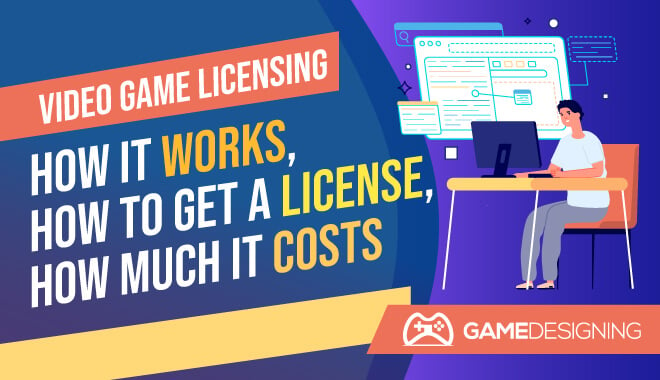
When you download a game from digital stores, it feels like you own it. You paid for it. You installed it. It shows up in your library. But in most cases, you don’t actually own the game — you’ve licensed it.
Video game licensing shapes how video games are made, distributed, and how long they stay available. For players, game developers, and publishers alike, licensing determines rights, restrictions, and what happens when a title disappears from the platform. It also creates new revenue streams for publishers, especially when a single license is reused across a wide array of games or services.
We’ve spent years designing and working on titles at various stages of development. Understanding licensing has been critical — not just for protecting our work, but for avoiding expensive mistakes with licensed content and intellectual property.
Key Takeaways
- Buying a game usually means licensing it, not owning it
- Licensing impacts how long a game stays playable or available
- Developers often license music, characters, or entire game engines
- Understanding licensing helps players avoid losing access to games they paid for
What Is Video Game Licensing?
A video game license is legal permission to use software under specific terms. It governs how a game can be played, shared, or modified — and often, what happens if the platform goes away. When you click “I Agree” on a Terms of Service or EULA, you’re entering into a licensing agreement. You’re not buying the game itself. You’re buying the right to play it, under certain conditions.
This has massive implications for game ownership, modding, and resale. And it’s one of the reasons even major studios like Epic Games, Warner Bros, and Activision Blizzard tightly control how their games are accessed or transferred.
Why Licensing Exists in Gaming
Licensing gives publishers control over how video games are distributed and updated. It protects intellectual property and helps manage liability. It also enables new game ideas by allowing partnerships across industries.
Developers can license entire game engines (like Unreal), animation tools, or famous characters from brands like Star Wars or Marvel. In return, they pay a license fee or share revenue. Without licensing, crossover titles or transmedia content wouldn’t be possible at scale.
Licensing vs. Ownership
Owning something means it’s yours outright. You can sell it, modify it, or lend it. Licensing is different. It gives you limited access, often tied to conditions.
You can lose access if your account is banned, if the platform shuts down, or if a license expires. Digital games from Steam, Xbox, and PlayStation are usually licensed. Physical games blur the line — you own the disc, but not the content on it.
How Video Game Licensing Works
What You’re Actually Buying
When you “buy” a digital game, you’re purchasing a license to use the software. That license often includes restrictions on resale, modding, or public display.
Some licenses expire. Others are revoked when companies shut down servers or change business models. In 2023, Ubisoft delisted Assassin’s Creed Liberation from digital stores — making it temporarily inaccessible to owners until backlash reversed the decision.
Types of Licenses
Licenses vary by platform, studio, and region. Common models include: single-user licenses (tied to an account), subscription licenses (Xbox Game Pass), time-limited licenses (seasonal content), and cross-platform licenses.
Each model defines what rights a player has — and what they might lose if the game is removed from the store or sunset by the publisher.
EULAs and Terms of Service
End User License Agreements (EULAs) are legally binding. Most players skip them, but they contain crucial details about what users can and can’t do with licensed content.
Common clauses include: no resale, no reverse engineering, no permanent access guarantees, and arbitration clauses. For developers, EULAs clarify how a game can be used once it’s live — across multiple platforms or even future editions like a sixth installment of a franchise.
Impact on Gamers
What Players Can and Can’t Do
Licensed games can be revoked, modified, or shut down without warning. A live-service game may stop working if its online servers go down — even if you paid full price.
You usually can’t resell or transfer a license. And if your account is banned, your access may be gone for good. Understanding the limits of licensing can save players time, money, and frustration.
Lost Access and Delisted Titles
Games often vanish when licenses expire. Scott Pilgrim vs. The World: The Game disappeared from digital stores for years due to expired music rights, only returning after extensive fan demand.
“Friday the 13th: The Game” was delisted after losing the rights to its IP. By the end of 2023, it was no longer available for purchase. Currently, about 1.5% of titles on Steam — or roughly 776 games — are delisted due to licensing changes or expired agreements.
Brand, Music, and IP Licensing Issues
Music rights, brand partnerships, and cross-media content all introduce licensing risks. Car brands, clothing lines, and popular songs are often licensed temporarily.
If a deal ends, the publisher may choose to remove or alter the game rather than renew. This makes it difficult to archive older games — and limits the ability to play them in the future.
Impact on Developers and Publishers
Using Licensed Content
Game developers regularly license third-party assets — from weapons and vehicles to celebrity likenesses. This speeds up development, but it comes with dependencies.
If a licensor revokes permission, the developer may be forced to remove, replace, or delist the content entirely.
Managing Costs and Legal Risks
A single mistake in licensing can result in lawsuits or takedowns. Studios need to manage IP rights carefully, often hiring legal teams to track usage and contract timelines.
The license fee for a major character or franchise tie-in can reach into the millions — especially for AAA titles with wide distribution.
Expiration and Sunset Clauses
Many licensing agreements include time limits or usage caps. Alan Wake was temporarily pulled from stores due to expired music licenses, even though it was a single-player story game.
Developers must anticipate these risks when planning DLC, re-releases, or future updates.
Legal and Business Considerations
Intellectual Property and Copyright
Games are built on layers of IP. That includes character models, voice lines, engine code, and interface design. Some of this is original; much is licensed.
Studios must juggle these IPs across regions, platforms, and promotional windows — especially when a new game includes remixes of previous content.
Licensing Deals and Revenue Streams
Licensing isn’t just a cost — it’s also a business model. Franchises like Star Wars, Batman, and Harry Potter generate massive revenue through game licensing.
Studios like Warner Bros and Activision Blizzard rely on licensed properties to attract players and grow new revenue streams. These deals also create risk, especially if fan expectations aren’t met.
Cross-Platform and International Licensing
What’s legal in one country may be banned in another. Game content is often changed — or blocked — based on regional laws.
Licensing across borders creates legal friction, making international publishing one of the most complex aspects of game development.
Criticism and Controversy
Preservation and Access
Licensing can harm game preservation. According to the Video Game History Foundation, 90% of games released before digital distribution are now inaccessible, unless preserved through archives or community emulation.
This erodes the cultural memory of games — and limits academic or historical study.
DRM and Consumer Rights
DRM (Digital Rights Management) tools often restrict player control. While intended to prevent piracy, DRM-heavy titles like SimCity (2013) suffered backlash when players were locked out due to server issues.
This adds to the perception that players are paying for temporary access rather than true ownership.
Lack of Transparency
Companies rarely explain when or why a game disappears. That leaves players frustrated and unprepared.
In response, California passed AB 2426 in 2024 — banning platforms from using terms like “buy” unless the transaction includes true ownership rights.
The Future of Licensing in Games
As more games shift to subscription models and streaming platforms, licensing complexity is increasing.
Platforms like Xbox Cloud Gaming and GeForce Now give players access to dozens of games — but only while the licenses last. That creates new risks for those who invest heavily in digital libraries.
Some studios are exploring blockchain, ownership tokens, or lifetime-access passes. But as of now, these solutions remain experimental and fragmented across the industry.
What Gamers Should Know
Before you play, check what rights you’re getting. Stick with reputable platforms. Backup where possible.
And if you’re a developer, make licensing part of your planning from the very start. It affects everything — from your art to your revenue to your game’s long-term availability.
FAQ
What is a licensing example?
A licensing example in gaming could be a developer paying to use a popular music track in their game. For instance, when a racing game includes real-world songs on its soundtrack, the publisher has licensed those songs from the music rights holders. If that license expires, the game might need to be edited or removed from stores.
What are the three types of licensing?
The three types of licensing commonly seen in video games are:
- Single-user licenses – These give one person the right to access and play the game, usually tied to a specific account or device.
- Subscription-based licenses – These provide access to a library of games for a recurring fee, like Xbox Game Pass or PlayStation Plus.
- Time-limited licenses – These are temporary agreements, often used for promotional events or seasonal content, which may expire after a set date.
Sources cited
- https://www.videogamehistory.org/digital-game-availability-2023/
- https://www.gamespot.com/articles/alan-wake-pulled-due-to-music-licenses/1100-6440112/
- https://www.theverge.com/2023/7/12/23790360/california-digital-purchase-law-ab2426-video-games
- https://igf.com/faq/what-are-sunset-clauses
- https://www.ign.com/articles/2013/03/07/ea-apologizes-for-simcity-server-issues
- https://www.gamesindustry.biz/xbox-game-pass-revenue-streams-and-risk-sharing
- https://www.businessinsider.com/activision-blizzard-earnings-licensing-revenue-2023-2




Leave a Reply